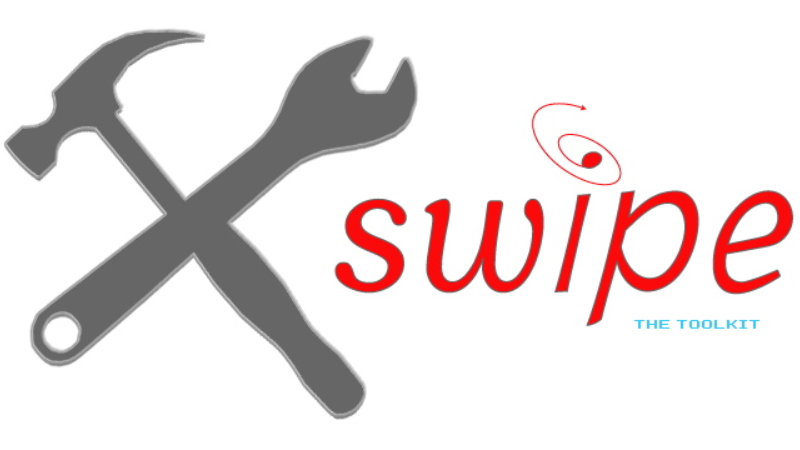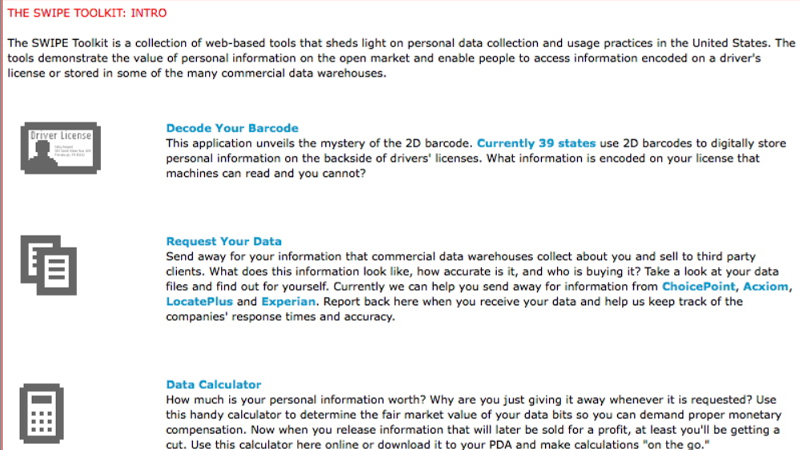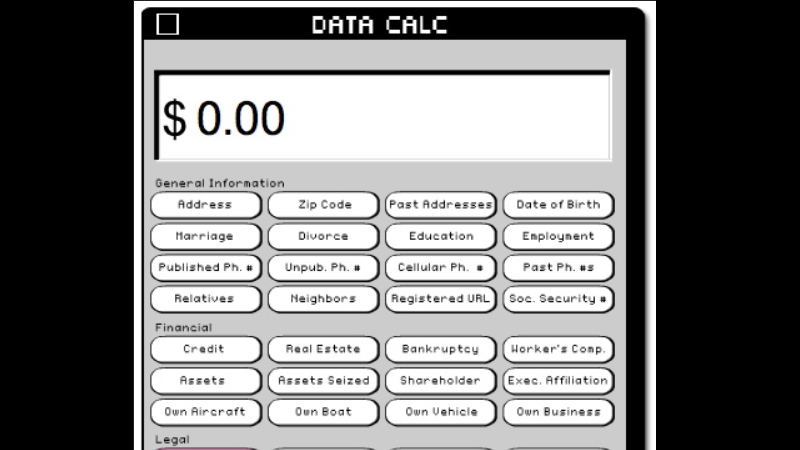"Beatriz da Costa (06/11/1974 – 12/27/2012) was a Machine Artist and Tactical Media Practitioner. Jamie Schulte is an engineer with an interest in designing systems that engage human aesthetics, culture, and politics. Brooke Singer engages technoscience as an artist, educator, nonspecialist and collaborator. Preemptive Media was a group of artists, activists and technologists – including Beatriz da Costa, Jamie Schulte, and Brooke Singer – who made their own style of beta tests, trial runs and impact assessments based on independent research.
With one swipe — that often occurs without notification or consent by the cardholder — a business can acquire data that can be used to build a valuable consumer database free of charge. Post 9/11, other businesses, like hospitals and airports, are installing driver's license readers in the name of security. And still other businesses are joining the rush to scan as they realize the information contained on driver's licenses is a potential gold mine.
The SWIPE Toolkit is a collection of web-based tools that shed light on personal data collection and usage practices in the United States. It demonstrates the value of personal information on the open market and enables people to access information encoded on a driver's license or stored in some of the many commercial data warehouses. 'With public knowledge there is a chance for public voices, and ultimately resistance,' say da Costa, Schulte and Singer. 'Our hope is to encourage thinking beyond the individual self ('I do not care if a bar database has my name and address and time of visit...') toward understanding databases as a discursive, organizational practice and an essential technique of power in today's social field.'
On May 10, SWIPE Released Findings Based on Use of Toolkit's 'Decode Your Barcode' App: 'The SWIPE Toolkit now includes an interactive map that reveals what information is encoded in 2D barcodes on US and Canadian drivers' licenses. Through use of the Toolkit's 'Decode Your Barcode' application (online version), SWIPE has been keeping tabs on the different kinds of driver information stored on 2D barcodes.
SWIPE has also been tracking the empty data fields (or placeholders) in the 2D barcodes. Placeholders indicate that a state/province is interested in storing this data on licenses but does not currently do so. Along with the interactive map, you can view the results in a table for quick comparison of states and provinces. Also available is the raw field count data in comma separated value (CSV) format. This information will automatically update with continued use of the online decoder. No other place can you find such a comprehensive and up-to-date description of what driver data the US and Canada are storing in 2D barcodes!'
Review: 'Swipe It. Swipe It Good: The collection of personal data has certainly become a more visible process in post-Patriot Act U.S.A, both for American residents and visitors. And it's no consolation to know that for every visible act of fingerprinting, there are even more instances of invisible archiving going on. Swipe, an ongoing project by new media artists/engineers Beatriz da Costa, Jamie Schulte, and Brooke Singer documents the process of personal data collection in the U.S., shedding some light on these hidden databases. The collaborative has released a new element of the project, an online 'toolkit,' featured on New Radio and Performing Art's Turbulence web portal. Swipe's toolkit includes such handy items as a calculator for determining the value of your personal data, forms for requesting a copy of the data that private companies have collected on you, and a bar-code reader that can decipher those printed codes on the back of many U.S. driver's licenses. The project also takes the form of live performances that include a cocktail bar. . . because you may need a drink when you find out what 'they' know about you.' - Ryan Griffis, Net Art News, Rhizome.org" -- from Turbulence
1 COPY IN THE NEXT
Published in 2004 by Turbulence.
This copy was given to the Electronic Literature Lab by Jo-Anne Green and Helen Thorington in Spring of 2016.
PUBLICATION TYPE
Showcase
COPY MEDIA FORMAT
Web


